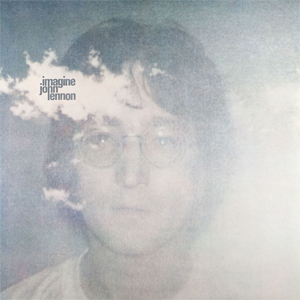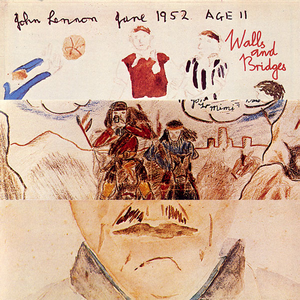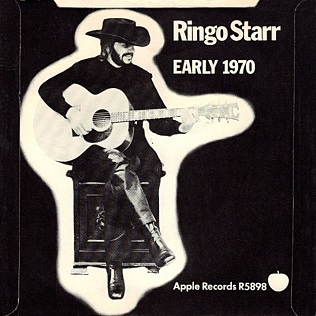Related Research Articles

The Beatles, also referred to colloquially as the White Album, is the ninth studio album and only double album by the English rock band the Beatles, released on 22 November 1968. Featuring a plain white sleeve, the cover contains no graphics or text other than the band's name embossed. This was intended as a direct contrast to the vivid cover artwork of the band's previous LP Sgt. Pepper's Lonely Hearts Club Band. The Beatles is recognised for its fragmentary style and diverse range of genres, including folk, British blues, ska, music hall, proto-metal and the avant-garde. It has since been viewed by some critics as a postmodern work, as well as one of the greatest albums of all time.

Imagine is the second studio album by British musician John Lennon, released on 9 September 1971 by Apple Records. Co-produced by Lennon, his wife Yoko Ono and Phil Spector, the album's elaborate sound contrasts the basic, small-group arrangements of his first album, John Lennon/Plastic Ono Band (1970), while the opening title track is widely considered to be his signature song.

Some Time in New York City is a part-studio, part-live double album by John Lennon and Yoko Ono as Plastic Ono Band that included backing by the American rock band Elephant's Memory. Released in June 1972 in the US and in September 1972 in the UK on Apple Records, it is Lennon's sixth album to be released under his own name, and his fourth with Ono. Like Lennon's previous solo albums, it was co-produced by Lennon, Ono and Phil Spector. The album's agitprop lyrics are politically charged compared to its predecessors, addressing political and social issues and topics such as sexism, incarceration, colonialism, and racism.

Mind Games is the fourth studio album by English musician John Lennon. It was recorded at Record Plant Studios in New York in summer 1973. The album was released in the US on 29 October 1973 and in the UK on 16 November 1973. It was Lennon's first self-produced recording without help from Phil Spector. Like his previous album, the politically topical and somewhat abrasive Some Time in New York City, Mind Games received mixed reviews upon release. It reached number 13 in the UK and number 9 in the US, where it was certified gold.

Walls and Bridges is the fifth studio album by English musician John Lennon. It was issued by Apple Records on 26 September 1974 in the United States and on 4 October in the United Kingdom. Written, recorded and released during his 18-month separation from Yoko Ono, the album captured Lennon in the midst of his "Lost Weekend". Walls and Bridges was an American number-one album on both the Billboard and Record World charts and included two hit singles, "Whatever Gets You thru the Night" and "#9 Dream". The first of these was Lennon's first number-one hit in the United States as a solo artist, and his only solo chart-topping single in either the US or Britain during his lifetime.
"How Do You Sleep?" is a song by British rock musician John Lennon from his 1971 album Imagine. The song makes angry and scathing remarks aimed at his former Beatles bandmate and songwriting partner, Paul McCartney. Lennon wrote the song in response to what he perceived as personal slights by McCartney on the latter's Ram album. The track includes a slide guitar solo played by George Harrison and was co-produced by Lennon, Phil Spector and Yoko Ono.

"Jealous Guy" is a song written and originally recorded by the English rock musician John Lennon from his second studio album Imagine (1971). Not released as a single during Lennon's lifetime, it became an international hit in a version by Roxy Music issued in early 1981; this version reached #1 in the UK and Australia, and was a top 10 hit in several European countries. Lennon's own version was subsequently issued as a single, and charted in the US and UK.

Goodnight Vienna is the fourth studio album by Ringo Starr. It was recorded in the summer of 1974 in Los Angeles, and released later that year. Goodnight Vienna followed the commercially successful predecessor Ringo, and Starr used many of the same players, including Billy Preston, Klaus Voormann, Robbie Robertson, Harry Nilsson, and producer Richard Perry. The title is a slang phrase meaning "it's all over".

Two Sides of the Moon is the only solo studio album by the English rock musician Keith Moon, drummer for the Who. It peaked at No. 155 on the Billboard 200. The album title was credited to Ringo Starr. Rather than using the album as a chance to showcase his drumming skill, Moon sang lead vocals on all tracks, and played drums only on three of the tracks, although he played percussion on "Don't Worry Baby". The album features contributions from Ringo Starr, Harry Nilsson, Joe Walsh of the Eagles, Jim Keltner, Bobby Keys, Klaus Voormann, John Sebastian, Flo & Eddie, Spencer Davis, Dick Dale, Suzi Quatro's sister Patti Quatro, Patti's bandmates from Fanny Jean Millington and Nickey Barclay, and future actor Miguel Ferrer.
"I Don't Wanna Be a Soldier, Mama" is a song written and performed by John Lennon, and released in 1971 as the fifth track on his second studio album, Imagine. The song's lyrics oppose the expectations of society.

"Gimme Some Truth" is a protest song written and performed by John Lennon. It was first released on his 1971 album Imagine. "Gimme Some Truth" contains various political references emerging from the time it was written, during the latter years of the Vietnam War. Co-produced by Phil Spector, the recording includes a slide guitar solo played by George Harrison, Lennon's former bandmate in the Beatles.

"It's So Hard" is a song written and performed by John Lennon, which first appeared on his 1971 album Imagine. Shortly after the album's release, the song was issued as the B-side to the single "Imagine". In Mexico, it was released on an EP with "Imagine", "Oh My Love" and "Gimme Some Truth". In 1986, a live performance from 30 August 1972 was issued on Lennon's live album Live in New York City.
"Oh Yoko!" is a 1971 song written and performed by John Lennon. It was first released on his album Imagine, and was later included in the greatest hits compilation Working Class Hero: The Definitive Lennon.

"I've Seen All Good People" is a song by the English progressive rock band Yes, written by frontman Jon Anderson and bassist Chris Squire and recorded on their third studio album, The Yes Album (1971). The almost 7-minute song is in two parts; the first, titled "Your Move", was released as a single in 1971 which peaked at number 40 in the US, which helped the group build momentum. The second part is entitled "All Good People".

John Lennon's musical instruments were both diverse and many, and his worldwide fame resulted in his personal choices having a strong impact on cultural preferences.
"How?" is a song from John Lennon's second solo album Imagine, released in 1971. Lennon recorded "How?" on 25 May 1971 at Ascot Sound Studios, during the sessions for his Imagine album. String overdubs took place on 4 July 1971 at the Record Plant, in New York City.

"Mamunia" is a song written by Paul and Linda McCartney that first appeared on Wings' 1973 album Band on the Run. It was also released as the B-side of the "Jet" single in the US, but was replaced by "Let Me Roll It" when "Mamunia" was being considered as a possible future A-side.

"Imagine" is a song by British rock musician John Lennon from his 1971 album of the same name. The best-selling single of his solo career, the lyrics encourage listeners to imagine a world of peace, without materialism, without borders separating nations and without religion. Shortly before his death, Lennon said that much of the song's lyrics and content came from his wife, Yoko Ono, and in 2017 she received co-writing credit.

"Early 1970" is a song by English rock musician Ringo Starr that was released as the B-side of his April 1971 single "It Don't Come Easy". A rare example of Starr's songwriting at the time, it was inspired by the break-up of the Beatles and documents his relationship with his three former bandmates. The lyrics to the verses comment in turn on Paul McCartney, John Lennon and George Harrison as individuals, and the likelihood of each of them making music with Starr again. In the final verse, Starr offers a self-deprecating picture of his musical abilities and expresses the hope that all four will play together in the future. Commentators have variously described "Early 1970" as "a rough draft of a peace treaty" and "a disarming open letter" from Starr to Lennon, McCartney and Harrison.
References
- ↑ Madinger, Chip; Raile, Scott (2015). LENNONOLOGY Strange Days Indeed - A Scrapbook Of Madness. Chesterfield, MO: Open Your Books, LLC. p. 239. ISBN 978-1-63110-175-5.
- ↑ Christgau, Robert (1981). "John Lennon: Imagine". Christgau's Record Guide: Rock Albums of the Seventies . Ticknor & Fields. ISBN 0899190251 . Retrieved 2 November 2018.
- ↑ Sulpy, Doug (2007). Drugs, divorce, and a slipping image : the unauthorized story of the Beatles' "Get back" sessions. The 910. p. 261. ISBN 978-0-9643869-8-3.
- ↑ "Interview with John Tout, May 1998".